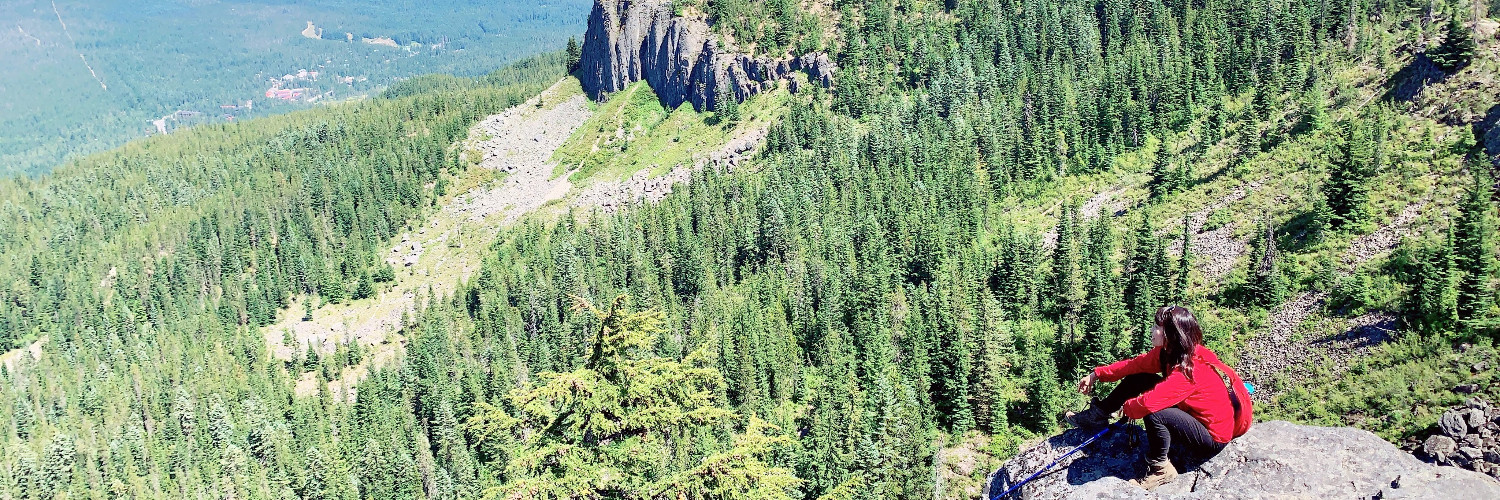

Ting-Ru Yang
PhD student
Currently, I am a PhD student in University of New Brunswick, Canada.
I am majoring in forestry and the research topic is to improve accuracy and consistency of forest inventory predictions via the assist from remote sensing tools. In this project, I have experience on dealing with big data in R language software, building related models for forest management decision-makings, and communicating with people from different countries to solve problems or share findings.
I am a person with a strong curiosity and willing to spend time analyzing and solving problems. My expectation for the future career is applying my analytical skills to various fields or more complex issues, and further developing the services or products matching the market demands. So far, I have published nine articles in international journals. This achievement proves my learning ability and perseverance.
Now, due to the COVID-19, I go back to Taiwan for the whole summer. Therefore, I am looking for a part-time job or internship opportunity to strengthen practical analysis skills and increase relevant work experience different from forestry.
University of New Brunswick
National Taiwan University
Yunlin, Taiwan
Professional Background
- Current statusStudying
- ProfessionData Scientist
- FieldsSoftware
- Work experience1-2 years (Less than 1 year relevant)
- Management
- Skills
- LanguagesChinese・Native or BilingualEnglish・Fluent
- Highest level of educationMaster
Job search preferences
- Desired job typeIntern・Interested in working remotely
- Desired positionsApplied research engineer (computer vision)
- Desired work locationsTaiwan
- Freelance
Work Experience
Lab Manager and Research Assistant
Conduct research projects and write research manuscripts
Lab Manager and Research Assistant
The research topic is linking field measurement data and panorama imaging. The goal in this year is collecting data as much as possible. My work is organizing field investigation team, training crew to use required instruments, familiar with the all process of shooting panorama, arranging fieldwork time and other matter, and leading crews to conduct field work.
Research Assistant
Process unmanned aerial vehicle stereo images of bamboo forests and density estimation
Afforestation Business Consultant
Process applications for funding afforestation projects
Administrative Assistant
Schedule department events, maintain working environment and assist department administration
Field Research Assistant
Conduct field survey, data quality assurance and processing
Education
Master of Science (MS)
・
Forestry and Resource ConservationDescription
The quantitative silviculture project was full of challenges because of the complex structures, diverse species compositions, and very few proposed solutions. This project was developed into my Masters thesis. I presented preliminary results at the 2016 Western Mensurationists Meeting held in Stevenson, WA, USA. During the meeting, I met Dr. John Kershaw, a professor at the University of New Brunswick. He had visited Taiwan in Fall 2015 and I had served as his assistant during his time there. I not only shared the problems I encountered as I was doing the analysis for my thesis, but I also knew that his research topics, including statistics and research with light detection and ranging (LiDAR), were benefit for me to achieve my career goals. As a result, we had a preliminary discussion on the LiDAR research he was conducting, and decided to combine LiDAR with traditional forest inventory as a potential research direction for my PhD program. Dr. John Kershaw not only could provide me the professional and technical knowledge I need, he also could help me meet more experts from different institutions. Therefore, I can interact with experts from many different specialties, which will enable me to improve my organizational and communications skills, and understand forestry more comprehensively. These experiences have strengthened my leadership skills and communications capability with both professionals and communities. They allow me to reach a wider audience including industry to explain often out-of-reach complex scientific results and contribute more to public and forestry sectors.
Bachelor of Science (BS)
・
Forestry and Resource ConservationActivities and societies
I come from rural Taiwan where there are no museums or science laboratories. Young students who study there have less chances to see science in action. To help my community, I was active in my rural hometown giving lectures on science and environmental issues to elementary school children. I led walks around the school and farms to observe animal and plant life. These were excellent opportunities for me to learn to communicate with nonscientists. Influenced by these experiences, I have obtained a license as an environmental educator.
During my senior year, I was vice president for our departmental badminton team, and led our team to win our fifth consecutive national Forestry Department Border Cup championship. I also was a public relations person for the Forestry Night (a public talent show) committee. I worked around performers’ timetables, scheduled rehearsal dates, advertised the event, reached out to the community for financial support, and communicated with performers to know their concerns and encourage their efforts.
Description
During my undergraduate program, I was very active in community services. Disabled people in Taiwan are often marginalized or ignored. I have a strong sense of social justice, and felt compelled to help those less fortunate than myself. I worked with social workers to design activities for disabled people. We used simple sport competitions to exercise their limbs, market shopping to encourage them to express their demands and practice simple life etiquettes, and simple food preparation like dessert making. I shared my experiences with my peers to encourage them to get involved with disabled people. Even though it was not a required component of my undergraduate program, I completed an undergraduate research thesis evaluating accessibility of Neidong National Forest Recreation Park. The idea stemmed from my voluntary work with disabled people and discussions with social workers, who believed that contact with nature has positive effects on the mental health of disabled people. Barrier-free environments in Taiwan’s forests are rare, because it is not easy to balance between ecology and barrier-free facilities. During the project, I spent time with the park staff to understand the facilities, and interviewed disabled people to record their concerns. I shared my results with the secretary of the Taiwan Forestry Bureau, and my thesis is now used as a reference for future planning. Throughout my project and volunteering, I acquired management skills essential to complete projects on time and communication skills to express my views well.
After I completed my Bachelors degree, I followed my parent’s hope of having a steady career by passing the civil service exam but I failed to pass it. At that moment, I felt that I lost my life’s direction and I could not figure out what job was suitable for me if I did not work in the field of forestry. Because I knew that I only had basical theoretical knowledge, but without practical operation skills, I realized that I was not any different than any other college student. After self-reflection, I initially talked with Dr. Tzeng Yih Lam, my supervisor for the Master degree, about my worries and sought his advice and opinions. I told him that I wanted to become a consultant who could solve international issues. He gave me a lot of advice and direction to focus my dream, and made me recognize that there were many opportunities I could have, if I chose to step out of the traditional social thought in Taiwan of just getting a steady career. As a result, I nervously initiated the discussion of the future I wanted with my parents, and convinced them to agree with my decision to pursue a Master's degree program to strengthen statistical knowledge, programing skills, and organization abilities.
To enhance all aspects of my abilities, I was hired by Dr. Tzeng Yih Lam as both a lab manager and research assistant during my transition year between my Undergraduate and Masters programs. I handled daily operations of the Forest Mensuration Lab including giving tutorials and scheduling equipment use, making arrangements for foreign visiting scholars, and assisting in fieldwork. The fieldwork provided me opportunities to practice measurement techniques, understand the potential utility of optimal panoramic imaging, and communicate with senior staff who worked on the National Taiwan University Experimental Forest. I managed two research projects, one on simulation of sampling designs and the other on quantitative silviculture. I needed to carefully plan both projects so that they progressed satisfactorily. I was in constant communication with our lab programmer to ensure simulation programs were error free, and with our data providers to resolve data quality issues. I was also a teaching assistant for 4 courses: Statistics, Forest Mensuration, Forest Management Quantitative Analysis, and Student Service Education; with an average of 20 students per course. I helped in preparing and grading lab materials, conducting labs and supporting students in their learning. In the process, I learned how to simplify complex concepts and clearly explain them to students.


